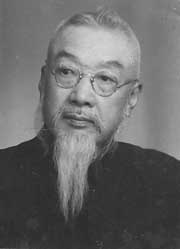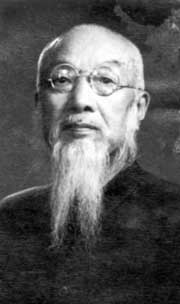

These are the only two pictures of my grandfather I can find
Links:
Return to Homepage:Description of Artworks:
My Grandfather, Yunhuai Gao 高荫槐 and His Art Collections
The ancient Chinese art works introduced on this page are from my grandfather's collection.
Collecting Chinese paintings, calligraphy and antiques was my grandfather's favorite hobby. Born to a scholar-gentry noble Manchu family, my grandfather, Yunhuai Gao got a good education in his early years and was accomplished at music, chess, literature and painting which were considered the basic requirements for a scholar-gentleman in ancient China.
During his younger years, he renounced the pen for the sword and became a high-ranking general officer of the Guo Ming Dang Party (Nationalist Party) by his middle age. He took part in a famous battle which was called Tai Er Zhuang and worked as one of the deputy commanders-in-chief (Lu Hang, another famous figure in Chinese history was the commander in chief of that battle). In order to save Long Yun, the King of Yunnan, my grandfather wielded his famous long sword, assaulting the enemy camp bravely. The story had been on everybody's lips until he died in 1976, he was compared to Guang Yu, a praised general from the novel The Stories of Three Kingdoms. Long Yun survived the battle, but my grandfather lost his left eye. He was active in the Huguo Movement which meant protecting the nation and supported Cai Er to against Yuan Shi Kai. His last title before liberation was Commander-in-Chief in Kunming.
During the Second World War, the Anti-Japanese War, my grandfather led his troops to fight against the Japanese alongside Communist Party's troops under the leadership of Zhu De, who was his classmate in the College of Army in Yunnan. Zhu De later became a chairman of the People's Conference of the Communist Party and was respectfully called Marshal Zhu due to his outstanding contribution in the war. As a result of my grandfather's merits and achievements in the Anti-Japanese War, he lived with the support the of Communist Party after liberation although he didn't belong to that party.
In my memory, I had a happy childhood in my grandfather's house. A big courtyard decorated by fresh flowers all the year round growing against the walls was the place I played with my cousins and other members of our extended family. My grandfather never stopped collecting his favorite paintings, calligraphy and antiques. He also kept up his skill of brushing Chinese calligraphy in his later years. I learned so many ancient Chinese poems from him that I took advantage of jumping to the third grade without going to first and second grades. I missed these early years of school because of going to countryside with my father to accept re-education during the Cultural Revolution (the story of Moon Cake mentioned that time). He made a lot of artist friends, collecting many famous art works from them. Xu Bei Hong was one of his friends and he sent my grandfather his representative work Painting of Galloping Horses. He was proud of inviting his friends to share his art collection in his house. The periodical personal art exhibition was the happiest event in his remaining years.
The worst thing that occurred during my grandfather's life was he lost his most treasured possession. Red Guards searched his house and confiscated his property, taking nearly all of his art collection, during the period of Cultural Revolution. I no longer heard his hearty laughter nor saw him happily brushing calligraphy after his collection was taken away illegally.
1976 was a disaster-ridden year in China although it was the year of the dragon by the Chinese lunar calendar. A Dragon implied Emperor, power, luck and happiness is the holy simple in Chinese hearts. But he became extremely angry in the year and didn't offer his favor to the people who had been extremely deferential to him. A earthquake of over 8 grade occurred in Tan Shang which is close to Beijing destroying the whole city. Three important national leaders, Zhou En Lai, Mao Ze Dong and Zhu De passed away that year. The country faced many a severe test and challenge that year. My beloved grandfather couldn't dodge the Dragon's anger and he passed on in September 1976 at the age of 84. But history will remember his name forever. When people read the history book of Yunnan, they can't miss the shining pages about my grandfather.
In the early 1980's my father got some of the art works back from the government. Most of them were not returned and are considered as a "voluntary" contribution to the country from my family because they are priceless. In the Provincial Museum of Yunnan, more than 50 pieces, once in my grandfather's collection, can be found. Others are in the National Museum in Beijing.
Brief introduction of some of his collection